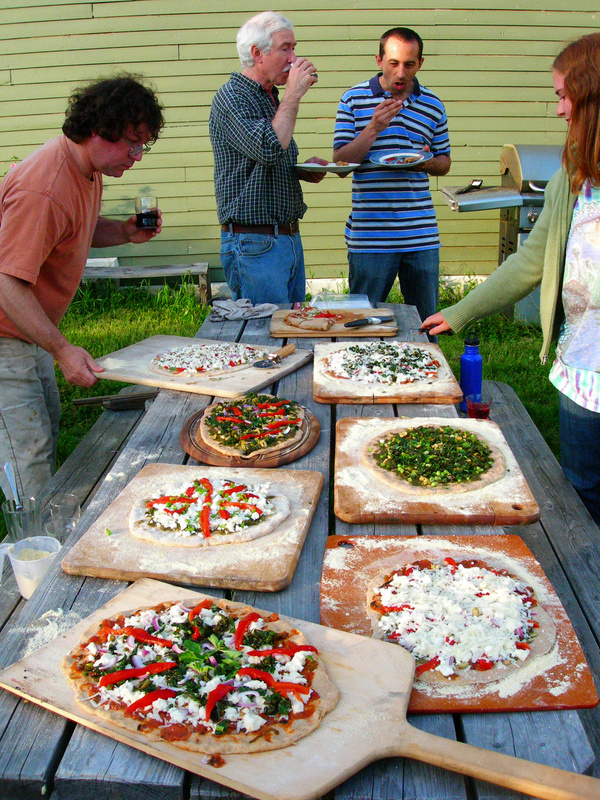For environmentally minded folks, the news these days is grim. The Gulf oil disaster, toxic chemicals in kids’ toys and pesticides poisoning our food – it’s enough to make you lose your appetite.
But don’t expect to find people lamenting the less-than-stellar state of the world this weekend in Unity.
That’s where the sixth annual Northeast Permaculture Convergence comes to Maine for the first time and, according to the event organizers, permaculture enthusiasts tend to be action-oriented optimists ready to tackle tough circumstances and emerge better for it.
“Permaculturists are not doom-and-gloom people,” said Lisa Fernandes, who is helping coordinate this year’s convergence. “There are a lot of challenges and a lot of bad news out there, but permaculture asks, ‘What can we do now?’ ”
If you’re like me, you’ve heard the word “permaculture” before but don’t have a clear definition in your head. I asked Fernandes to shed some light on the subject.
“A lot of people think about permaculture as a gardening technique, but it’s a whole property-design technique,” said Fernandes, who is also the organizer of Portland Maine Permaculture. “It’s a set of skills for creating sustainability and resilient human settlements. It’s based on ecological patterns and designed for the long term.”
Permaculture is an approach to living in harmony with the Earth – which is equal parts philosophical and practical – and incorporates principles of self-sufficiency and interdependence. It asks us to acknowledge our oneness with the natural world, while taking pragmatic steps to make our lifestyle more harmonious with and less abusive of other living things around us.
This can include everything from landscaping with edible, perennial plants to installing renewable energy systems.
“It’s really about creating landscapes that take care of us more than we take care of them,” Fernandes said. “Any piece of property can benefit from permaculture. A porch on Munjoy Hill or 30 acres in Buxton and everything in between.”
The event sets up shop at the Maine Organic Farmers and Gardeners’ Common Ground Education Center and is expected to attract close to 250 people. Expect a crowd that’s an equal mix between seasoned permaculture practitioners and people just learning the ropes.
Because food is central to permaculture, it’s no surprise that Local Sprouts Cooperative Cafe has been tapped to provide all the conference meals. These eats will include lots of organic and locally sourced ingredients, and plenty of vegan and vegetarian options.
People who plan to participate in one of Friday’s three optional field trips will start arriving Thursday night. The first excursion goes to the Newforest Institute in Brooks and Teltane Farm in Monroe. The second trip heads to Humustacia Permaculture Gardens in Whitefield and Avena Botanicals in Rockport.
The final outing journeys to Four Season Farm and the Good Life Center (the former estate of Helen and Scott Nearing), both in Harborside.
The schedule for Saturday and Sunday is packed with more than 40 workshop sessions. In addition, there is a full slate of kids’ activities, and all children under 13 get in free.
Some of the highlights from the adult events include a talk by David Yarrow on how to use charcoal to boost soil fertility; a workshop by Jim Merkel on foraging for edible plants; a talk by Sarah Tracey on how to create edible forest gardens for schools; a hands-on session with Stuart Silverstein and Noah Wentworth on how to build a wood-fired cob oven; a workshop with Ryan Wilson about ecological farm design; a session with Mark Krawczyk on how to minimize irrigation on large farms; and a talk by Jonathan Maxson about the vegan approach to permaculture.
Also on the docket is a talk by Julia and Charles Yelton, who run the Humustacia Permaculture Gardens and are considered the elder statesmen of permaculture in Maine. The pair will offer a workshop Saturday afternoon called “Our Cosmological Connections,” which takes a global look at our interconnectedness with the world around us and the responsibilities that entails.
According to Julia Yelton, interest in permaculture is growing here in Maine and throughout the Northeast.
“When we brought permaculture here in 1997, people didn’t even know what we were talking about,” Yelton said. “(Since then) the Northeast has become a very rich region for permaculture.”
Merkel, who is also one of the event coordinators and the co-executive director of the Newforest Institute, said Maine is ripe for a permaculture revolution.
“We have some of the nation’s leaders in organic farming and permaculture here in Maine,” said Merkel, who is the author of “Radical Simplicity.” “Most Mainers already know what permaculture is, even if they don’t use the word.”
For Fernandes, permaculture makes a perfect fit with Yankee ingenuity and self-reliance.
“I think Maine is really fertile ground for permaculture because a lot of permaculture is good common sense,” Fernandes said. “We have a tradition of being resilient and working with neighbors to overcome challenges. Other parts of the country have lost that resilience.”
This is one more reason to celebrate our corner of the globe. And with so many permaculturists in the state this weekend, I’m hopeful that their can-do approach to the world’s woes will linger once the event is over.
Because as Merkel observed, “The economy and the oil spill are both related to living out of balance with nature. But when you have your garden planted, the world economy can do what it likes and you’ll still have your vegetables.”
Staff Writer Avery Yale Kamila can be contacted at 791-6297 or at: akamila@pressherald.com
Send questions/comments to the editors.


